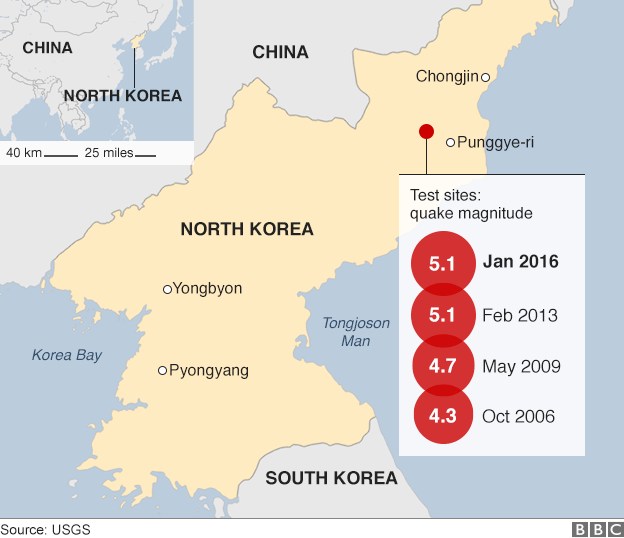North Korea celebrated the New Year with a bang. How big a bang has become a matter of dispute. Pyongyang insisted that they have detonated their first hydrogen bomb, just two days before celebrating young dear leader Kim Jong-un’s birthday. Other observers weren’t so sure that the seismic disturbance monitored from the explosion was big enough to pass as a nuclear fusion and not just another nuclear blast from fission.

The technical authenticity of the nuclear explosion was not really the issue. The consequent reaction from the international community was, to quote the well-known baseball philosopher, the late Yogi Berra, “it’s like deja vu all over again.” The UN Security Council met to impose more sanctions on North Korea. Washington, Tokyo and Seoul made a show of solidarity by voicing the same vigorous objection to the latest nuclear test by Pyongyang.
So how did North Korea react in the face of heavy censure and condemnation? Other than expressing displeasure at the PA, which was assaulting their eardrums with K-Pop from the other side of the DMZ, nothing much. North Korea had set off three previous atomic explosions and had by now gotten used to the international condemnation and sanctions.
Aside from turning the PA system back on, the only other outside response that could be considered “new” was for the USAF to fly a B-52 over the Korean peninsula, as if that sort of intimidation would bring the North Korean regime to their senses.
Even the final act of exasperation by Secretary of State Kerry was no different from past practices by his predecessors. He called China’s Foreign Affairs ministry to tell them that China’s approach on North Korea was not working and that North Korea’s behavior was a problem that Beijing needs to fix. Historically, whenever Washington gets frustrated with Pyongyang, North Korea becomes China’s problem to fix.
Invariably, every provocation by North Korea begot reaction by the Americans and allies leading to standoff and stalemate. Nothing changed yet tension has heightened. Is there a real way out?
According to his just released book, My Journey at the Nuclear Brink, former Secretary of Defense William J. Perry recounted how the U.S. and North Korea nearly concluded a deal in 2000. He led the effort as the Defense Secretary and continued in that role even after he left the Clinton administration. Unfortunately, the Clinton term of office expired before a treaty could be concluded.
Then George W. Bush entered the White House and he refused to continue the dialogue with North Korea. No doubt under the influence of the axis of neoconservatives, namely Cheney-Rumsfeld-Wolfowitz, no self respecting president of a hegemon needed to talk to a member of the Axis of Evil—my conclusion, not Perry’s. For two years there were no meetings and no conversation between the two countries.
Even when the Bush administration resumed contact with the Pyongyang regime, the Bush team insisted that North Korea commit to halting any uranium enrichment as a pre-condition to any negotiation. The result was that both sides withdrew from the “Agreed Framework” hammered in place in late 1994 that had kept Pyongyang’s nuclear weapon development on hold.
According to Perry’s book, under the Agreed Framework, “North Korea agreed to stop all construction activity on two larger reactors and suspend their reprocessing to produce plutonium from the smaller, already operational reactor. South Korea and Japan agreed to build for North Korea two light water reactors (LWRs) for producing electricity; and until the LWRs were operational, the United States agreed to supply fuel oil to compensate North Korea for the electricity it would forfeit by shutting down its reactor.”
Perry went on to say, “I considered this a good deal for the US: war was averted, plutonium production suspended, and North Korea gave up (permanently, it appears) their program for building the larger reactors that were under construction.”
The consequence of tearing up the agreement was that North Korea resumed the production of weapon grade plutonium culminating in the first nuclear bomb test on October 9, 2006. As Perry ruefully observed to a group of admirers at a recent dinner party in Silicon Valley, getting North Korea to give up their possession of the bomb now was going to be much more challenging compared to an earlier time when it was possible to strike a deal before they had developed a bomb. Thus an opportunity for a nuclear free Korean peninsula was tragically lost.
In trying to remediate the increasingly poisoned relation between the U.S. and North Korea, China organized the six party talks in 2003 by inviting Japan, Russia and South Korea to the mix. But the mutual distrust between Pyongyang and Washington ran deep and the talks got nowhere. The only tangible outcome from the exercise was that the Americans could now hand North Korea over to China as their problem.
When President Obama entered the White House, his administration continued the Bush practice in their approach to North Korea, i.e., preferring confrontation to negotiation and blaming China to assuage their own frustration from lack of progress with North Korea.
Based on the history Perry recounted, it should be increasingly apparent to Obama that only a security treaty with the U.S. will mollify Pyongyang and convince them to behave more in accordance with acceptable global norms. Pyongyang sees that the U.S. can strike a deal with the other surviving member of the axis of evil, namely Iran. Why then won’t the U.S. negotiate a deal with North Korea? Setting off the most recent nuclear test could be Pyongyang’s way to get Washington’s attention.
With his remaining days in office, Obama needs to decide whether it’s more important to maintain the hegemonic pride and arrogant disdain or to revert to the basis began in the Clinton administration and pave a way forward to find a breakthrough with Pyongyang. If he decides on the latter, it will be a long process and no doubt become a legacy for his successor to finish the job—or not.
For Obama to have any chance of success, he would need help from China’s Xi Jinping. As I suggested previously, only a collaboration including China and South Korea could persuade Pyongyang to come to the negotiating table. On the other hand, the alignment of the U.S. and South Korea with Japan—good for raising the decibels of disapproval—would have no influence and leverage that would convince North Korea to cooperate.

